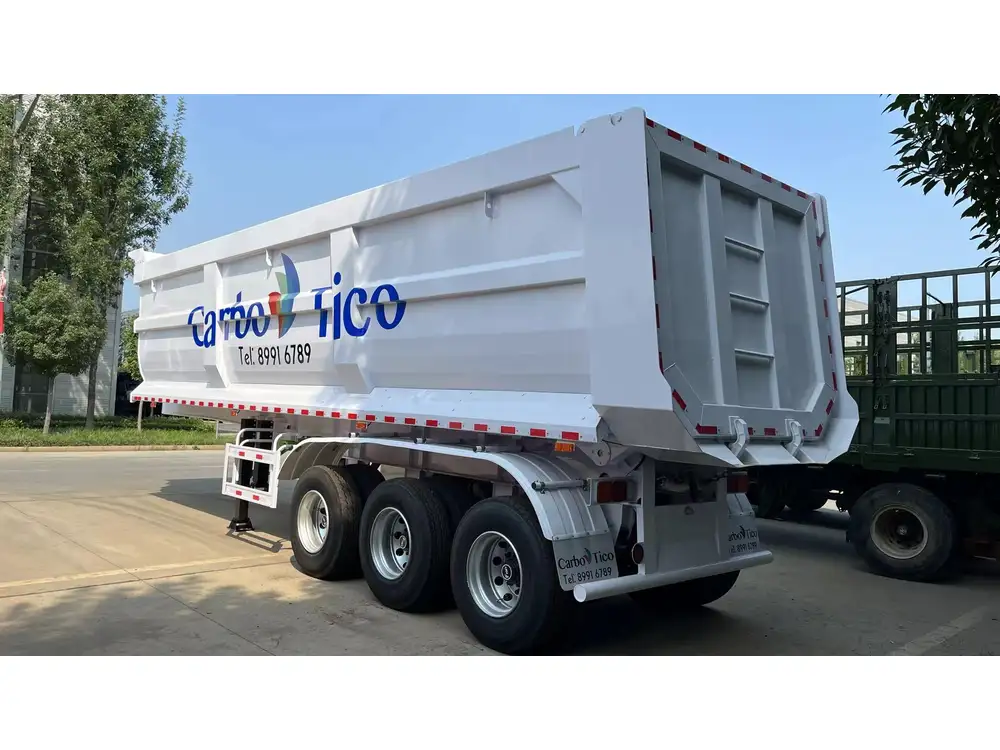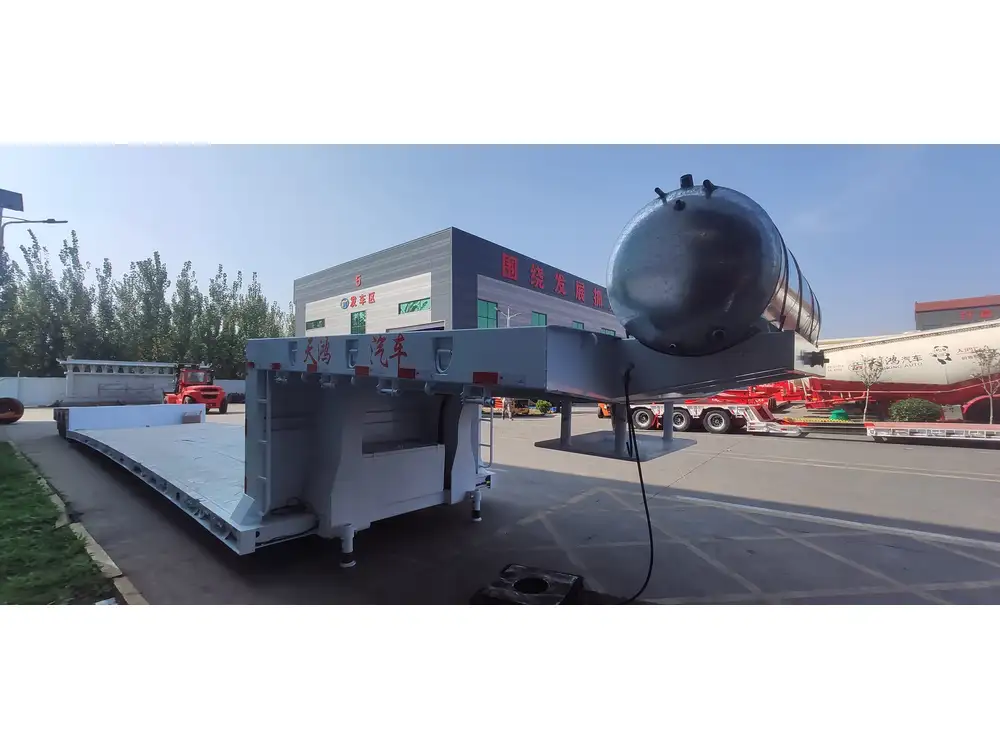When it comes to transportation in the logistics and freight industry, understanding the specifics behind the equipment used is crucial. Reefer trailers, known for their ability to transport temperature-sensitive goods, have gained significant traction across various sectors. In this comprehensive guide, we will explore the question, “How much does a reefer trailer weigh?” Alongside, we’ll delve into related aspects such as weight classifications and implications for transport efficiency.
What is a Reefer Trailer?
A refrigerated trailer, or reefer trailer, is a type of trailer designed to carry perishable goods at regulated temperatures. Commonly utilized in the transportation of food products, pharmaceuticals, and other temperature-sensitive items, reefer trailers come equipped with insulated compartments and built-in refrigeration units.
Common Reefer Trailer Weights

Typical Weight Ranges
Reefer trailers generally vary in weight based on their size, construction materials, and specific design features. Here’s a breakdown of the typical unladen (empty) weights for common reefer trailers:
| Type of Reefer Trailer | Length | Average Empty Weight (lbs) | Average Payload Capacity (lbs) |
|---|---|---|---|
| Standard Length | 48 ft | 10,000 – 13,000 | 37,000 – 43,000 |
| Standard Length | 53 ft | 12,000 – 15,000 | 34,000 – 40,000 |
| Mid-Sized Length | 40 ft | 9,500 – 12,500 | 37,500 – 44,000 |
| Custom-Length Trailers | Varies | 10,000+ | Varies based on specifications |
Factors Affecting Weight
Several factors can influence the weight of a reefer trailer, including:
Build Materials: The choice of materials can significantly affect the overall weight. For instance, aluminum trailers are lighter than steel counterparts.
Insulation: Advanced insulation technologies can add weight but also improve thermal efficiency.
Refrigeration Unit: The type and size of the refrigeration system used can contribute to an increase in weight.
Additional Features: Custom features like extra compartments for storage or enhanced thermal systems can also impact the overall weight.
Understanding GVWR and Payload Capacity

Gross Vehicle Weight Rating (GVWR)
The GVWR is a critical measurement that determines the maximum weight a trailer can safely carry, including its own weight. For reefer trailers, this rating is essential to ensure compliance with trucking regulations and maintain road safety. The GVWR typically spans from 65,000 lbs to over 80,000 lbs, depending on the trailer design.
Payload Capacity
Payload capacity refers to the total weight a reefer trailer can handle beyond its unladen weight. Understanding this metric is vital for shippers to maximize load efficiency, minimize excess weight, and adhere to regulatory constraints.
| Weight Metrics | Measurements (lbs) |
|---|---|
| Average Unladen Weight | 10,000 – 15,000 |
| Typical Payload Capacity | 34,000 – 45,000 |
| Standard GVWR | 65,000 – 80,000 |
Reefer Trailer Regulations and Compliance
Navigating the roadways with a reefer trailer requires adherence to a collection of regulations aimed at safety and efficiency. Regulations can vary by state and country; however, here are some overarching guidelines:
Maximum Weight Restrictions: Understanding the legal maximum weights for each state is crucial for legal compliance and avoiding penalties.
Temperature Monitoring: For the preservation of goods, maintaining proper temperature ranges inside a reefer trailer is regulated by health codes and industry best practices.
Licensing: Operators should ensure that they possess the appropriate commercial driver’s license (CDL) for operating heavy trailers.

Implications of Trailer Weight on Logistics
Fuel Efficiency
The weight of a reefer trailer directly influences fuel efficiency. Heavier trailers require more power to operate, resulting in increased fuel consumption. Hence, optimizing trailer weight can significantly affect a trucking company’s bottom line.
Load Distribution
Proper load distribution within a reefer trailer is critical. An unbalanced load can lead to increased wear and tear on the vehicle and may even result in unsafe driving conditions. Ideally, maintaining a low center of gravity will enhance stability on the road.

Maintenance Costs
Understanding the weight of a reefer trailer can also affect long-term maintenance costs. Heavier trailers may endure more stress on components such as tires, brakes, and suspension systems, leading to more frequent and potentially costly repairs.
Comparing Reefer Trailers to Other Trailer Types
Reefer Trailers vs. Dry Van Trailers
While dry van trailers serve well for general cargo, reefer trailers are specialized for temperature-sensitive shipments. Here are quick contrasts between the two types:
| Feature | Reefer Trailer | Dry Van Trailer |
|---|---|---|
| Purpose | Temperature regulation | General cargo without temperature control |
| Average Weight | Heavier due to insulation and refrigeration | Lighter typically |
| Operating Costs | Higher due to fuel and maintenance | Generally lower for cargo management |
| Regulatory Compliance | Stricter due to perishable goods | Relatively lenient |

Reefer Trailers vs. Flatbed Trailers
Flatbed trailers are essential for non-enclosed cargo transportation. However, they lack the temperature control features found in reefer trailers. Here’s how they stack up:
| Feature | Reefer Trailer | Flatbed Trailer |
|---|---|---|
| Trailer Design | Enclosed with refrigeration | Open, flat surface |
| Load Types | Perishable goods, pharmaceuticals | Building materials, heavy machinery |
| Weight Considerations | Heavier, complex design | Lighter, simpler construction |
Key Takeaways
Understanding the weight of a reefer trailer is more than an academic exercise—it has significant implications for shipping efficiency, regulatory compliance, and overall operational cost. Here’s a summary of critical points:
Weight Awareness: The average weight typically ranges from 10,000 to 15,000 lbs, with payload capacities affected by various factors.
Cost Implications: Heavier trailers could incur greater fuel costs and maintenance expenses.
Compliance Necessities: Trailering regulations ensure safety on the roads, necessitating an awareness of state and federal weight limits.
Choosing the Right Trailer: Reefer trailers offer specialized solutions for specific freight types, albeit at higher operational costs compared to other trailer types.
Conclusion
For operators and shippers alike, gaining a detailed understanding of how much a reefer trailer weighs is vital for streamlining logistics operations and ensuring compliance with industry regulations. By recognizing the various factors influencing trailer weight, stakeholders can make informed decisions that enhance efficiency, reduce costs, and maintain fleet integrity. Whether considering upgrades, maintaining optimal loading practices, or adhering to transportation laws, knowledge is essential for success in today’s competitive transportation landscape.



